The 500-odd farmers of Gurha Kumawatan, a village in arid Rajasthan, are now millionaires thanks to polyhouse farming. Their hard work, innovation and unlimited ambition offers a path to prosperity for others in India.
Making Indian farmers richer and agriculture ecologically sustainable is at the heart of organic dairy brand Akshayakalpa’s business
 TR Vivek
TR Vivek Organic dairy firm Akshayakalpa’s 24-acre corporate headquarters-cum-factory near Tiptur, 150km to the west of Bengaluru, gives off the strong vibes of a solemn spiritual ashram.
When steel-tanker milk trucks emitting diesel fumes aren’t lined up at the gate, the thickly wooded entrance, with parijatas in full bloom and countless other aromatics in the flower beds, conjure up the smell of scented vibhuti or sacred ash.
Business such as sales review and training is conducted in squat, circular thatch-roofed huts amidst experimental plots with rows of sugary cherry tomatoes and fern-like carrots.
An unpaved red soil track leads to the source of the rich and healthy smell of manure and ammonia–the gaushala, rather in this case, the R&D centre with about twenty cows reared on organic principles Akshayakalpa wants its partner farmers to follow.
A conversation between farmer and consumer
Among the mostly local employees clad in indigo polo-Ts there are plenty of tourists from Bengaluru even on a weekday. They are a mix of converts and potential converts. It’s a dip of the toe for them. A first-hand experience of the organic food heaven helps spread Akshayakalpa’s organic gospel better than Instagram reels or wordy brochures.
They can caress the cows that wander untethered like deer in a zoo but keen as Labrador pups to befriend strangers and watch them feed on organic Napier grass grown a few metres away. A guided tour of the milk factory and a vegetarian meal at the small canteen with food made entirely from the organic produce grown in the campus follow.
On some days, the dip could turn into immersion, if Shashi Kumar, the stocky 50-year-old co-founder and CEO of Akshayakalpa is around.
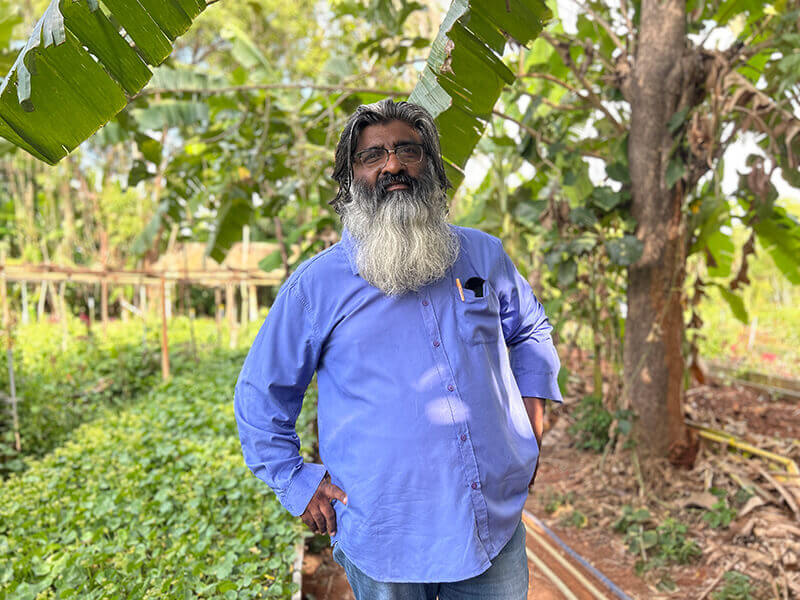
Radical chic
Shashi Kumar was a rebel who wanted to ring in a revolution. Softened by the pressure cooker of time burnt on the stove of social entrepreneurship in India’s farm sector, he now appears yogic in his attire and attitude. Clothes in varying fades of blue seem to be his improvisation of the fakir’s ochre. Shashi’s Bhishma-like beard touches the second button, and the unkempt mop of hair reaches beyond the collar of the steel-blue shirt. He can’t quite recall when the shirt was bought, but the pair of denims are decidedly older. For him, the kind consumerism manifested by the hoarding of clothes, and the agricultural crises, have a common link: mindless, unthinking consumption and the methods of production that make it possible.
In 2010, Shashi, an IT professional with a successful career at Wipro, and 27 other friends from a similar background chucked up their jobs with the lofty ambition of “changing” Indian agriculture. They were convinced it was utterly broken. A lot of data and a bit of lived experience showed farming was pretty much unviable as a profession for small farmers in India. Couldn’t Indian farmers become rich, was the question that animated the group.
“The cost of food for the consumer is massively underwritten by State subsidy for inputs such as fertilizers, water and power. The farmers subsidise it further by not properly accounting for their land and labour. The situation is so unsustainable that we soon won’t have people to grow food for us,” says Shashi.
They believed it needed fixing by those who had cracked problems of a higher order. Arrogance was an angel investor in Akshayakalpa.
“IT guys think they are best read, best educated, they know everything about the world. Changing agriculture was easy. That’s the aham [ego] we had. But when we started getting deeper and deeper into farming, we realised that it changed us rather than a bunch of IT guys changing it. The only way to start is to pick a small problem and try to solve it,” says Shashi with a soft, beatific voice, in a south Karnataka accent unsullied by a decade of onsite-ing in the US.
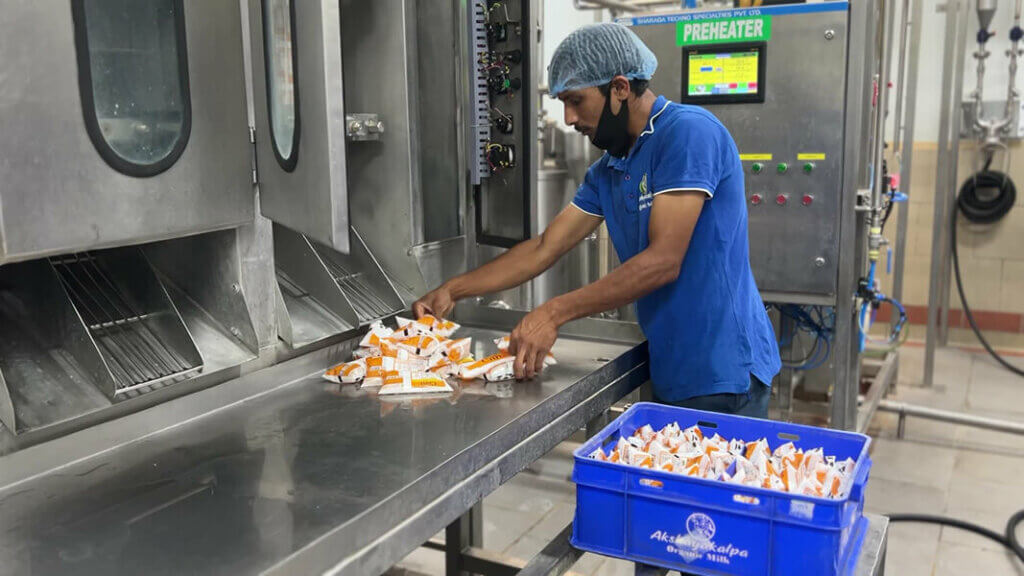
Low cash flow
Not surprisingly, milk is the nucleus of Akshyakalpa’s business. It works with 800 dairy farmers in two close-knit clusters near Tiptur in Karnataka and in a village near Chengalpattu, 80 km from Chennai. Its factory processes 80,000 litres of milk a day producing premium products for Bengaluru, Chennai and Hyderabad markets ranging from milk to ghee that command at least twice the price of popular brands thanks to its organic and antibiotic-free credentials.
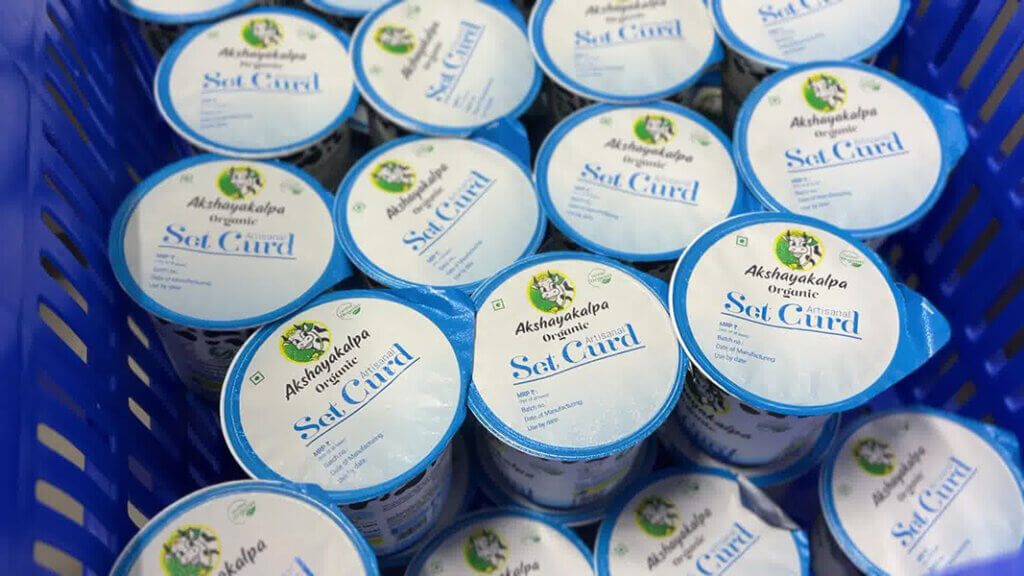
“No policy can change the viability of farming. Only the consumers can if they start looking at every aspect of their consumption. They must become more quality conscious and ask questions about who produces their food at what cost, how it gets to them, and how good the food can be if they are paying such a low price. They should go visit a farmer, work with them in the field for a day and share a meal. It’s in their own interest. Today social media glorifies farming and romanticises the farmers so much that it is nowhere near the actual, grim reality,” says Shashi. The purpose of the farm tours is partly to start a much-needed conversation between farmers and consumers.
According to Askshayakalpa, farmers with as little as two-acres who comply with the company’s organic and broader regenerative agricultural practices can make as much as Rs 150,000 a month in about two years of transitioning from conventional methods. Half of the monthly payout goes into the bank account of the female member of a farmer household to ensure that they are adequately compensated for their often-invisible role in running the operations, and also as a safeguard against the hard earned money ending up in liquor shops.
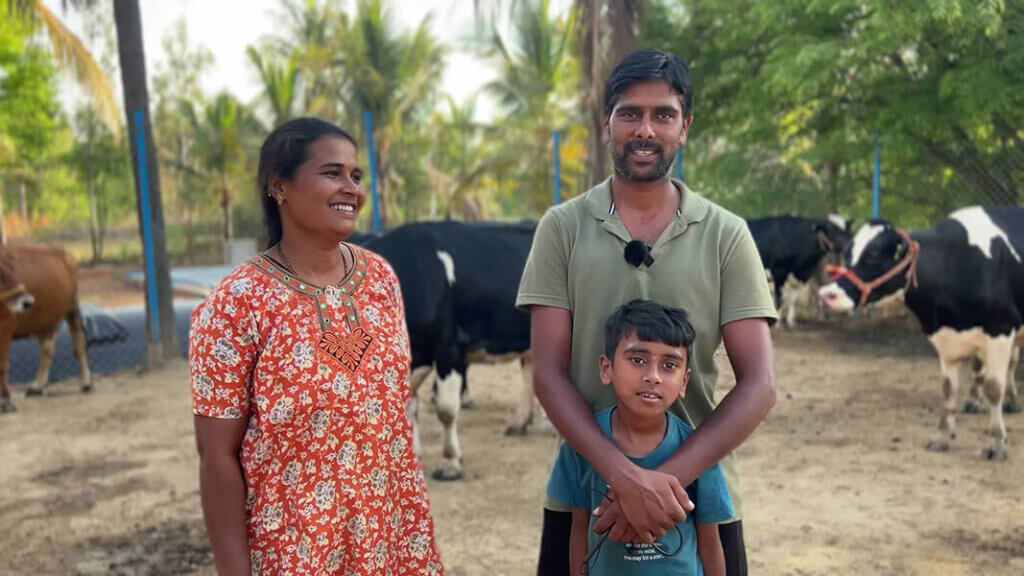
A fourth of its 800 employees consist of field workers and trained agronomists who start work at 6 am on their two-wheelers visiting the 800-odd farmers on a daily basis, addressing their problems, gathering cattle health data and ensuring they stick to organic practices.
Soil is supreme
Shashi’s inspiration for having a strong technical support network for farmers is the work of researchers at the University of California in Davis. “Farmers in the Salinas valley, a big agri belt, don’t have to go anywhere to access new innovations and scientific research. The university’s agri department works out of their fields. Thanks to such coordinated work, almost all farmers have successfully turned organic,” he explains.
Organic or not, dairy is not an easy business to operate, especially at the relatively tiny scale Akshayakalpa operates. Its monthly sales currently exceed Rs 20 crore. More than half of India’s dairy sector is controlled by co-operatives brands such as Amul in Gujarat, Nandini in Karnataka and Mother Dairy in Delhi and many parts of north India. “But our real interest is soil, not milk. Yes, dairy, poultry and coconut generate much-needed, quick cash flow for the farmer. We want to make them part of a larger ecosystem where the cow dung and poultry manure [it has three times more nitrogen that cow dung] substitute inputs like fertilizers and rejuvenate soil, used to make clean domestic fuel, and where beekeeping integrated into the farming system increases pollination,” says Shashi.
Proponents of organic farming say it is entirely misunderstood in India. While produce gets the attention, it is all about soil management. Keeping it nutrient rich and teeming with microflora is at the heart of good organic farming practices.
Organic riches
Shashi grew up in a farming family around Tiptur. His father, still an active farmer at 78, did not have the means to educate his three children. He put young Shashi in his elder brother GN Srinivas Reddy’s care. Reddy was a veterinarian and a well-regarded farm activist influenced by the ideals of Mahatma Gandhi and Vinoba Bhave. “My father wanted me to be an engineer because he knew one who was successful. Engineers were role models, farmers weren’t,” says Shashi.
When Akshayakalpa’s founders travelled the villages to better acquaint themselves with rural realities, they found that most places had turned into retirement homes. There was hardly anyone below the age of 45. Who would produce food for the next generation if the youth desert the farms?
An engineering degree that led to a good life on the US west coast held little charm. Reddy not merely infected his nephew with his own brand of agri- idealism but also became a co-founder of Akshayakalpa. “Before we made our first sale, my uncle went on a 25-day milk-diet to convince himself that our product was good. One of my best memories is the two of us, on the first day of our consumer outreach, convincing eighteen morning joggers in Krishna Rao Park in Bengaluru’s Basavangudi, to become Akshayakalpa subscribers after we gave them a tasting sample,” adds Shashi.
We work with one farmer in a village for a number of years; support him in the transition to organic; and prove to others around that this is a viable model. We run an open-source model. Anyone is free to copy what we do.
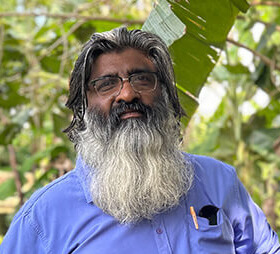
Can the consumer care?
Despite being in the direct-to-consumer market, Akshayakalpa’s ambitions are modest. At best, it hopes to work with 5000 farmers.
“We work with one farmer in a village for a number of years; support him in the transition to organic; and prove to others around that this is a viable model. We want that farmer to become an inspiration to everyone around. We run an open-source model. Anyone is free to come and copy what we do. In fact, we’d count that as our success,” says Shashi.
Selling expensive organic farm produce in a price conscious market such as India is a hard grind. For example, an Akshayakalpa country egg costs Rs 24 or roughly three times the price of one at the corner shop. Keeping consumer prices reasonable, means taking a hit on margins; lowering the margins for retailers would discourage them from sticking products that require additional care like refrigeration; and competing in the direct-to-consumer market with multiple giants can be brutal and expensive.
By Shashi’s estimation, Akshayakalpa has been on the verge of bankruptcy on six occasions in the 12 years it has been in business. Each time bailed out somehow by his friends who Shashi jokingly calls the 27 fools. Akshayakalpa’s commitment to regenerative farm practices keeping farm income at the centre has won it many admirers. At one of the low points in the business recently, Shashi says he turned to Nitin Kamat, the founder and CEO of Zerodha, the largest stock broking firm in India. “I don’t even know him well, but he was ready to back us,” recalls Shashi.
Last year, Zerodha’s Rainmatter Foundation that focusses on climate action invested in Akshayakalpa.
“What the company is really doing is building water, soil and farm resilience ground up that translates into broader rural resilience. Many of the practices its farmers follow start percolating to their neighbours. If even a third of the dairies in India start operating like Akshayakalpa, it would represent a gigantic change in our agroecology,” says Sameer Shisodia, CEO, Rainmatter Foundation.
The odds in the marketplace seem stacked against a small player such as Akshayakalpa trying to change farming practices and consumer attitudes towards food at once. But it would be good if it succeeded. “Look, it is too big a problem to solve in one lifetime of work. All we can do is try.”
The 500-odd farmers of Gurha Kumawatan, a village in arid Rajasthan, are now millionaires thanks to polyhouse farming. Their hard work, innovation and unlimited ambition offers a path to prosperity for others in India.
Want to visit the plant